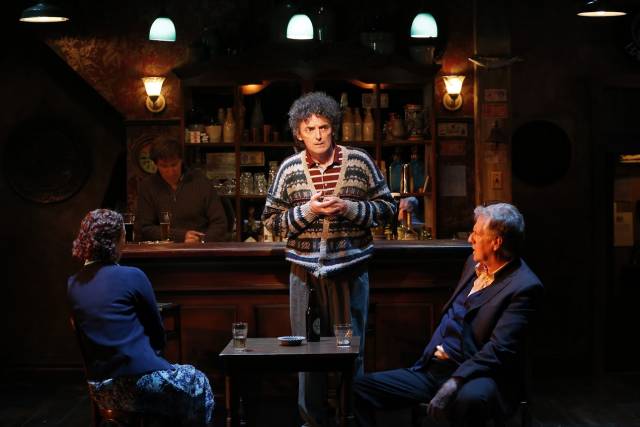

The Weir – Conor McPherson's most popular play – is generally billed as a ghost story. It has the creeping, ominous tone of horror, and it has a few tale-by-the-campfire-style monologues as well. And even though the Irish Repertory theatre advertises is as a play that “starts out as blarney [but] soon turns dark as the tales drift into the realm of the supernatural," the artists at work in the production recognize that the play is more about the persistent human grief that accompanies regret and loss than it is about the cheap fear of horror.
The setup of The Weir is simple. Valerie (Amanda Quaid), a woman from Dublin, is in a local town in the Irish countryside looking for a new place to live, an escape from the city. Finbar (Sean Gormley), a married local man with a flirtatious nature, shows her the town by day and brings her to a quiet pub at night. It is at the pub where we find them – along with a few regulars. The group exchanges stories, usually ghostly ones, while a cold wind blows in the background. The undercurrent of fear and isolation in these minor horror tales elicit ends up eliciting more tangible earthly anxieties about death and mourning.

The production borders a line between relaxed naturalism and the contrived constructs of theater. The dialogue is true-to-life and conversational; monologues are filled with casual asides and distraction. But there is a very clear structure at work, as each character (excepting Brendan, the mostly-quiet bartender) is given his or her time to tell a tale. There are moments when the theatricality of this structure can take an audience out of its voyeuristic enjoyment of watching these Irishmen have the craic in their local pub. But for the most part, it is easy to get lost in The Weir, to feel as if you are sincerely looking in as a silent patron sitting alone in the back of the establishment.
A lot of this is owed to pacing and blocking, which feels natural and true thanks to the direction of Ciarán O’Reilly, a founder and regular at The Irish Repertory Theatre. But even more is owed to the execution by the actors, who blend seamlessly and honestly into their roles and their community. The character of Brendan has the fewest lines, but Tim Ruddy is constantly demanding attention as the younger bartender who reveals much of himself in mannerisms and tones. John Keating is excellent as Jim, the meek drunk who’s always looking for someone who have a short one with him.
The play is ultimately uplifting in a way; it’s a celebration of the power of tipsy conversation in the middle of the night. But this celebration comes at the cost of mourning, and there’s a portentous undercurrent of fear and grief in The Weir that has more to do with the souls we’ve lost than the apparitions they might become.